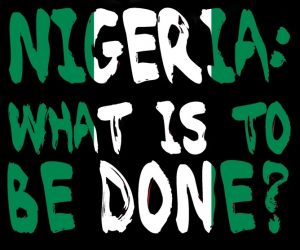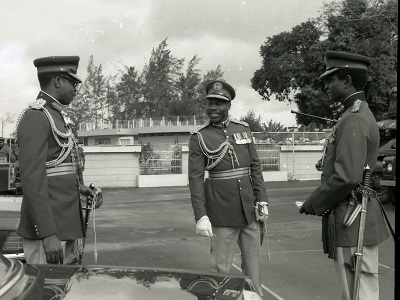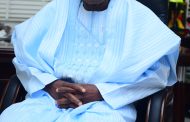Opposition to President Muhammadu Buhari on the management of generalized insecurity in Nigeria, particularly violent herdsmen is paradoxically uniting hitherto sworn enemies across the country. The most prominent ones so far would be that of Nobel laureate Wole Soyinka, General TY Danjuma and the Yoruba cultural platform, Afenifere with Chief Olusegun Obasanjo who, for different reasons, has been a sworn enemy of each of the three. For some reasons, these individuals and platform have seen things from a different angle from Obasanjo’s.

Isn’t this President Buhari’s camaraderie with Afenifere leaders now overshadowed by Afenifere current rapport with Obasanjo’?

There is likely to have been no picture of this nature involving Obasanjo and Afenifere leaders between 1979 and 2007 and even thereafter
While the disagreement between Soyinka and the Afenifere on the one hand and Obasanjo on the other dates back to the First Republic and bordered basically on differential attitude to the Yoruba Question in Nigeria, that of General Danjuma and Obasanjo is a recent development in the Fourth Republic. Before then, Danjuma spoke of Obasanjo as a hero, not only for drawing up a strategic blueprint that dramatically ended the Nigerian Civil War even when Obasanjo’s superiors in Lagos rejected the plan when he presented it but also for his secretarial competence in managing the kitchen cabinet of the Murtala regime. Suddenly, bitterness developed between the duo in the middle of Obasanjo’s first term in the Fourth Republic, the struggle for which Danjuma’s was position was that unless Obasanjo was elected president in 1999, he would go on exile. By 2008, the same Danjuma was in a mood foul enough to say that if Obasanjo’s braggadocio took him to Danjuma’s birthday bash in Lagos, he would ask his bodyguards to throw him out.
It is not clear if there has been a formal reconciliation between the two, they are now standing shoulder to shoulder on the position that President Buhari is implicated in a Fulanisation campaign. While Danjuma communicated this position most categorically in March 2018, Obasanjo tried to avoid saying so till May 2019. And when he did, he was found using nearly exactly General Danjuma’s vocabulary: Danjuma alleged collusion, Obasanjo alleged cuddling of agents of terror by the Buhari regime.
It is the most frightening manifestation of elite fragmentation in recent Nigerian history. Even the usually more subtle and middle ground minded members of the elite such as Prof Bolaji Akinyemi have now taken a position on the Ruga controversy, for instance, unless he were to disown a recent letter to the Vice-President widely published in the social media.
If the argument that the truth of any situation does not lie in the facts of the situation but in the perception of the situation, then it is clear Buhari presidential leadership has overstretched the few success areas in elite consensus in Nigeria. Only time will tell how that came to be but four points appear to stick out.
One is the charge of nepotism in his composition of government, particularly in composing the security team in a manner that could be interpreted and has been interpreted as a signal about a hidden agenda. The second is charge of weaponizing the anti-corruption agenda against opposition such that the only way out for many is to join the ruling party. The third is the charge of cuddling agents of scorched earth violence while the fourth is tight implication of the president himself in all these.

What is to be done and by whom?
How far the peace moves of Southwest traditional rulers in the aftermath of Obasanjo’s latest open letter to President Buhari would go is what everyone else is watching. This is especially as it is unlikely that there would be a Northern version of that move because of the fragmentation at several levels in the region. First is the sour relationship between the president/The Presidency and several top traditional rulers in the North while second is the deep division the herdsmen project has occasioned even within that group.
It is unbelievable that in the African country with the most hopeless development indicators relative to its privilege of over-abundance, the hottest issue in politics is elite quarrels rather than discussions on how to achieve rapid industrialisation. It brings to mind Claude Ake’s 1987 essay titled “How Politics Underdevelops Africa”. Ake is saying that the elite who should be raising the question of development are not interested in that but in other things. The idea was that democracy would kill politics as a hurdle against development because voters will eliminate intruders into the democratic space. Now, the dynamics have worked out in such a way that neither the voters have been above capture by neo-populists nor been allowed by godfathers to be able to vote in developmentalists. So and once again, politics has killed or is about killing development and perhaps the nation itself in Nigeria unless some honest brokers can act quickly. But who might they be and where might they be coming from?
The traditional rulers? Or the National Assembly? Is it the civil society through an emergent social movement that can seize the high ground by managing difference more sensitively? Or, is it by the elite magically re-inventing itself by hunting for and installing a unifier? A unifier is not necessarily the president in power. It helps if he or she is the sitting president but that is not a necessary pre-requisite. Or would this come from a President Buhari magically re-inventing himself from the path of self-vandalisation and self-disempowering in the eyes of critics by moving in a different direction from the one that has estranged him from many? That is unlikely, what with the president and his spokesmen insisting that corrupt politicians are the ones unleashing political herdsmen on Nigeria. Critics would say the president is in the wrong office if he cannot negotiate with such politicians even when he has not been able to stop them from unleashing mayhem, assuming the president’s claim is true. Others would also ask if the corrupt politicians helped the president compose his government in a manner that is open to charges of nepotism.
But something that accords more with the image of a Messiah that the nation fell for in 2015 would have been the best. In politics, anything can happen because it is supposed to be the art of the possible, not the art of the impossible.




























